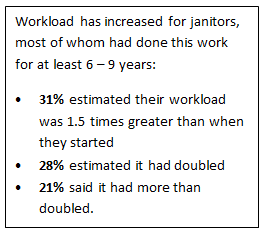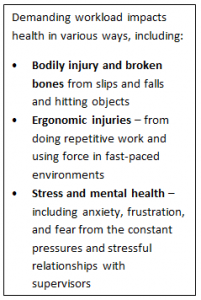Download the report: “Doing Too Much, Too Fast – How Workload Impacts Janitors’ Health and Safety”
“You go around racing to do the work because we have a set time, and we need to run and run and run, and sometimes, because of this, accidents happen. I think that is a huge concern that we all have as janitors.”
 Janitors described changes in the areas and spaces they clean as major contributors to their increased workload. Not only are they now cleaning more floors, but floors also have much higher occupancy with more cubicles and workspaces. As a result, there can be hundreds more desks to dust, areas to vacuum, and trash bins to empty. This is coupled with other trends – like reduced staffing, use of more time-intensive green cleaning supplies, and increases in the number and variety of tasks – which exacerbate the already challenging job demands.This statement was echoed by other janitors in focus groups about workload and its impact on their physical and mental health. LOHP carried out six groups around the state in a study for the Commission on Health and Safety and Workers’ Compensation. Most of the 59 participants cleaned office buildings and had worked in the industry for at least 6-9 years; half had worked as janitors for over 15 years.
Janitors described changes in the areas and spaces they clean as major contributors to their increased workload. Not only are they now cleaning more floors, but floors also have much higher occupancy with more cubicles and workspaces. As a result, there can be hundreds more desks to dust, areas to vacuum, and trash bins to empty. This is coupled with other trends – like reduced staffing, use of more time-intensive green cleaning supplies, and increases in the number and variety of tasks – which exacerbate the already challenging job demands.This statement was echoed by other janitors in focus groups about workload and its impact on their physical and mental health. LOHP carried out six groups around the state in a study for the Commission on Health and Safety and Workers’ Compensation. Most of the 59 participants cleaned office buildings and had worked in the industry for at least 6-9 years; half had worked as janitors for over 15 years.
“Excessive workload is a key contributor to job stress, and janitors shared very personal and at times painful descriptions of how this stress affected their daily lives at work and carried over into their relationships with their children and partners,” describes Suzanne Teran, who co-authored the study report. “Workers also described how they felt more prone to falls and accidents from working too quickly and being tired, and talked about ergonomic injuries as common and expected occurrences.” The report concludes with recommendations, including some from the workers, such as: setting realistic expectations in contracts and revising how work is assigned, and engaging building managers and clients so they understand the link between the contracts they negotiate and janitors’ work and health.
painful descriptions of how this stress affected their daily lives at work and carried over into their relationships with their children and partners,” describes Suzanne Teran, who co-authored the study report. “Workers also described how they felt more prone to falls and accidents from working too quickly and being tired, and talked about ergonomic injuries as common and expected occurrences.” The report concludes with recommendations, including some from the workers, such as: setting realistic expectations in contracts and revising how work is assigned, and engaging building managers and clients so they understand the link between the contracts they negotiate and janitors’ work and health.



